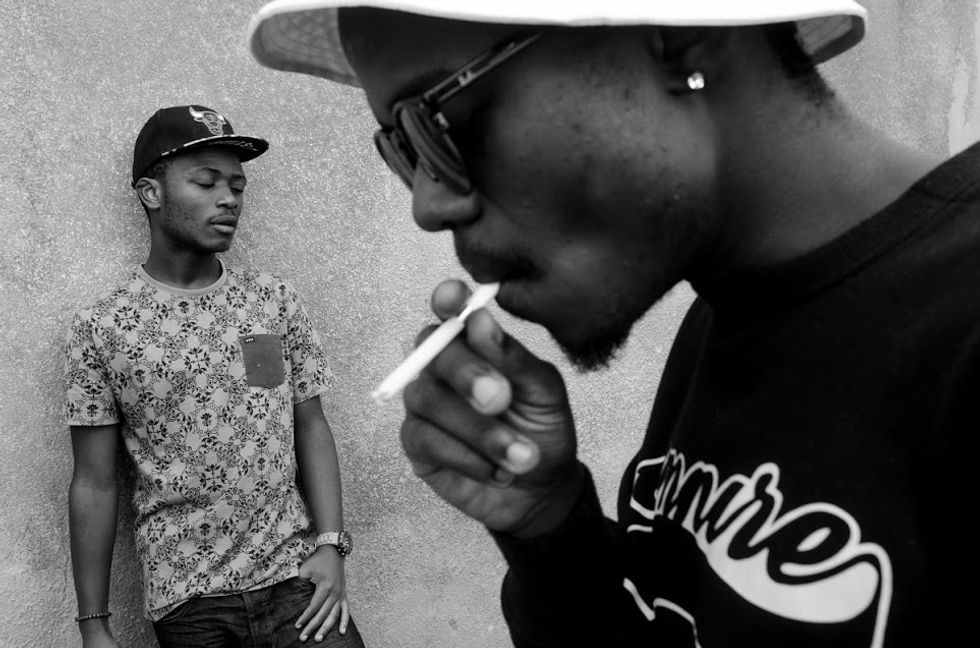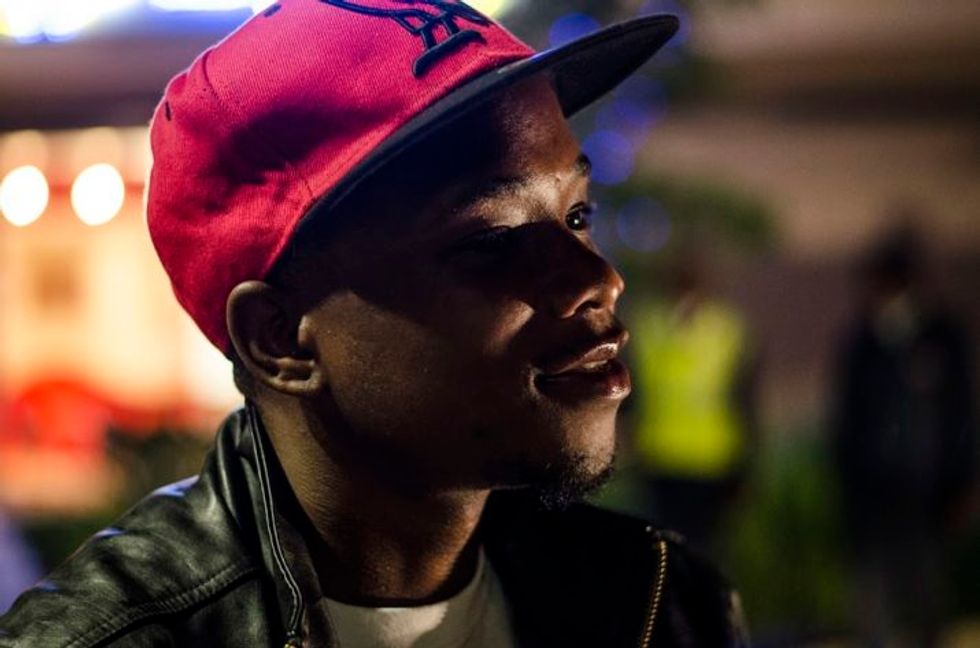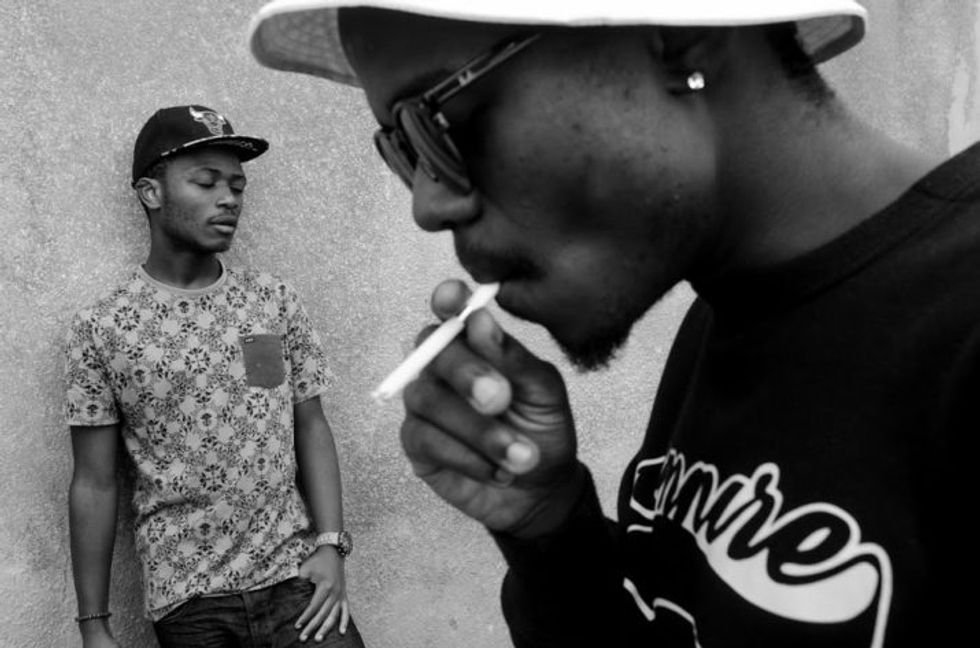On The Map: Maseru's Hip-Hop Scene
Tseliso Monaheng takes us inside Maseru's rap scene for the latest installment of Okayafrica's On The Map series.

Driving into Lesotho using the Maseru-side border post can be disconcerting. If you've been keeping an ear on the local news, you know that you're heading into a country that's been etching towards collapse; a country which welcomes you with headlines foreshadowing a shutdown of all government structures. It still feels strange even when you've no prior experience of the country nor its politics. Imagine tunneling down an unguided odyssey through a town which, on the outside, has neither seen much nor had much done to it since the British Empire left some 50 years ago.
Once on the main road—really nothing more than a two-lanes-per-side pathway on which potholes magically appear every day—giant billboards confront you. They advertise all manner of things, from retailers to banks, as they hang on street lights. They’re also a reminder of how far the country's rap scene has come.
A major cellular network provider with a sizeable ad budget has resorted to using rappers to promote some of their products on their billboards. Ten short years ago, this was unheard of. No one wanted to be associated with rap in any form, and even that is putting it lightly. Nowadays, it's commonplace to see any of the people I used to rock ciphers with way back then posing on a juggernaut bulletin board looking swanky in red merchandise, holding a product offered by the network provider.
Motlalehi Leshoele goes by the alias Papa Zee. As label owner of Big Bang Music Entertainment, a Maseru-based independent imprint, he’s privy to the machinations of music distribution as it applies to Lesotho, a country with no formalised recording industry to speak of.*
Papa Zee has a long-standing history as an event organiser, music producer, and one-time radio host. He's among the first wave of rappers to emerge from Lesotho in the early nineties.
“We had talent, we could make the music, but there was no exposure,” he says of those heady days. “We didn’t consider what we were doing at the time to be hip-hop. There used to be a punk movement; they were infamous for their tattered threads, berets, and chains. People thought we [the rap kids] were punks.”
He adds that even though many strides have been made in Lesotho, there are still hurdles which parallel those they were encountering as early as 1993.
“The whole world has moved forward, computers are here. That means people can [easily] make music. The internet is here, so one is able to release their music through [that] for people to hear,” says Papa Zee at the Bang Entertainment studios in Khubetsoana, an area about ten minutes drive north of the city centre.
“However, the challenging thing about all these beautiful things that people always scream about [is that you] just have go to the internet and look at how many views music videos produced on the African continent have on YouTube. The day you find one with more than 50, 000, let me know.”
In actuality, there are plenty of videos exceeding that number of views, but his point has been made. Essentially, Lesotho’s still not equipped—and this extends to other regions on the African continent—to handle online music selling services as currently delivered by the West due to bandwidth limitations, region restrictions, lack of access to debit/credit cards, and more.
Tello Leballo, or Dallas T to his listeners, is a radio DJ with over ten years of broadcasting experience. He was the first to have a show on national radio campaigning for the active promotion of local rap music on the airwaves. It's people like him who made it possible for audiences to gravitate towards hip-hop, a genre which was traditionally the reserve of outcasts and American wannabes.
"I took a different angle altogether and decided to embark on a talent search mission,” says Leballo of his previous job at Radio Lesotho where he hosted the twice-a-week show Molikong oa Bacha.
Many of today's well-known names—from Kommanda Obbs to Dunamis to Stlofa—got their first break on this very show or other shows on the same station.
The Radio Lesotho days witnessed a young, rebellious Leballo religiously play songs submitted by artists from across the country despite most of them being of sub-standard broadcast quality. Leballo used to have a Public Enemy song as the backbone of his jingle during family time listening on weekends.
He carried this spirit of routing for locally-produced music when he moved to his current home at Ultimate FM, Radio Lesotho's sister radio station, where he hosts The Knock Off.
"It was part of the radio synopsis [at Ultimate FM]. I was actually one of the chief advocates; I had other presenters backing me up,” he reveals.
Leballo's experience behind the control boards is unparalleled. Watching him at work – fielding calls, cueing music, preparing to go on-air – one gets a sense of someone with a passion for what they do. He continues to carve his own lane despite the criticism leveled against him, most of which has to do with artists not understanding the procedures involved in getting their song playlisted.
His chart show every Thursday has become the unofficial barometer for how admired a song is among the rap audience.
Leballo is careful to acknowledge other radio figures that have been selfless in nurturing a very young, very niche movement – from Denver Queen to Miss P and many more. Miss P, real name Pearl Ocansey, passed away a few years ago, leaving behind a void in the lives of all those whose careers she contributed to.

One of the featured faces on these billboards is Lerato Leteka. He won a talent search competition in 2015, and with that came a cash injection and increased visibility in the mainstream. Not that he needed the visibility; he'd been grinding away at his craft ten years prior through rap ciphers and a stream of singles which at every turn reveal a new side of his multiple personas. L-Tore, Leteka's rap name, can hold his own against anybody. He's a freestyle don, a voltron vocalist and a writer who possesses supreme flair. A producer in his spare time, he's got the gift of gab to accurately predict whether a song's going to become a hit or not. Live, he exudes a confidence befitting his swagger. His stage presence is second-to-none.
Nowadays, Nkopane Mohola is a television upstart with promising prospects. He starred in Ya Lla in 2015, a Sesotho-themed South African cable channel's drama series depicting life in the mines. He latched onto another role following that, as Tokelo in the currently-airing series Greed & Desire. In his other life, Mohola (or Terama) was a rapper whose contribution to building the rap scene as is currently can't go overlooked. His most recent rap outings have been with Thulo Monyake, or Lemekoane, one of the most dedicated ‘workers’ (for lack of a better word) in the scene.
Lemekoane is a producer and an emcee, but also a talent scout, cross-generational cultural connector and much more. I meet him on a hot Saturday afternoon at his hide-out located a short walk from Maseru’s CBD. Inside a three-bedroom house, a flurry of emcees and producers hang about while beats play in the background. Lemekoane’s uncle, Chocolate Soul, a producer who’s earned his stripes within the hip-hop circles, and extended his reach to house music, walks in and out, providing commentary where required.
The session underway is for "325is”, produced by Chocolate Soul. Lemekoane is going through his rhymes, written on a Blackberry, in-between offering his two cents’ worth on the topics of discussion going on among the more than five people in the house. He takes time out to zone in, adjusts the mic and then starts rapping. "U bone banana ha ba tlola trata/ ho qhoma lerole pel'a ka/ ka u siea, oa sala/ ka tsipa, ka u shapa." I catch him spitting some of these lines on the instrumental with a heavy trap influence.
As chief architect of another independent imprint based in Maseru, Music In Progress, and arguably Lesotho’s most in-demand producers/engineers is, he's overseen the production processes behind some big radio hits. He’s come a long way from kicking ciphers in front of the PC FM radio studios during the weekly Sprite Rap Activity Jam (a talent search competition), to having his face on outdoor billboards advertising a cellphone network.
Lemekoane's excited about the present, but focused on the future. "When I started, there was very minimal material that you could actually place your hands on or listen to. Access to it wasn’t as wide as it is now," he says.
He reckons that the current heightened wave of interest in rap is being fuelled by the change in the mindset of rappers, and suggests that a heightened level of focus now exists. “The guys that decided to stop being followers and more leaders and motivators. The likes of Duna [Dunamis, rapper] for example,” says Lemekoane. Dunamis is Rets’elisitsoe Molefe, the first Lesotho-based rapper to have a video—"Mastered seed," directed, shot, and edited by Hymphatic Thabs—playlisted on continental television.
For the most part, women have been missing from rap music. That isn't to say they're absent, but rather that a scene which tends to focus on one aspect of the movement (rap) usually fails to acknowledge other important sides. It's also a metaphor for the (in)visibility of women in our society.
Raised on a steady diet of great rap music courtesy of her former producer and rapper brother's vast hip-hop collection, MC Meloh, real name Boitumelo Lofafa, was poised for dopeness early on, should she ever decide to take rap seriously. She did, and the going seems to be good.
Naturally, questions about her place as a woman in a male-dominated scene are bound to flow. But maybe she's concerned about other things; maybe she views that as other people's problem, and would rather focus on improving her skill and being a great asset to the Ragga Vybz collective, of which she's a member.
"The type of artist I am seeks to better themselves in comparison to rappers around the world, no gender filtering," she says over an e-mail exchange. "People will understand that me being female makes my art no more extraordinary than a guy who can rap, because I am going to force-feed everybody my style, my conscious thoughts and lyrical arrangement,” asserts Meloh.
She lists roots reggae artists such as Kabaka Pyramid and Protoje, and emcees like Invisible and Rhapsody as infinite sources of inspiration. “I believe I am a good artist due to the passion I put into my work, [and] due to the type of music that motivates me," she says.
Journalist Mookho Makhetha has done commendable coverage on Lesotho's rap scene. She's written about acts such as L-Tore and Kommanda Obbs, and has recollections of the early days when all the scene had going for it was rap ciphers and poorly-attended shows.
Makhetha has intimated, in in-person exchanges as well as on her tongue-in-cheek Twitter timeline, that the scene is going nowhere fast judging from how most rappers still carry themselves. She's been the victim of big-talk-no-action brigades whose only hustle is a Facebook status update of the 'download my new single' variety with a Datafilehost link attached.
In an e-mail exchange for this piece, Makhetha says that a lot of artists still aren't putting the effort required to make an impact. "If I am going to write about your music for a global audience, the least you can do is upload the audio file to something that is not Datafilehost! Diversify your distribution channels, man!" she says.
More detrimental, though, is how artists lack what she terms a ‘vision’ for their careers. "They just want to make the music and release it in the hopes that people will like it," she says. If there is indeed a vision, Makhetha supposes that perhaps then there's reluctance on the artists’ side to either share it, or to reveal "anything meaningful about their art."
But Makhetha's had fun moments, like when she bumrushed Hlompho Letsielo in a particularly busy section of town during rush hour traffic. She got a substantial piece out of that, as she did out of Kommanda Obbs.
Hlompho Letsielo was chiefly known as a photographer. When he passed away in 2015, it was after directing the video for "P.U.S.H.", on which he also has a feature verse (he was also a rapper).
Alongside his partner, cameraman and editor Sehlabaka Rampeta, Letsielo was poised to contribute to a visual landscape which was going to elevate Lesotho hip-hop's place in the global hip-hop community. The "P.U.S.H." video, and another one released posthumously, were merely test runs.

Papa Zee released a Sesotho-only album Psalm 23 to critical acclaim in 2010. Besides taking care of the artists on his label and running other businesses on the side, he’s working on a long-awaited follow-up album (“people who are expecting Psalm 23 part two will be disappointed” he lets slip).
“The question is what level we’re on in terms of new media. Where is it in relation to our people? I don’t think we’re there yet. I feel we have access to the internet. The question is whether our immediate market, our niche, is that advanced to utilise the resources provided by the internet. I don’t think they are there yet.”
"You find that artists don't have the facilities which would enable an Amazon.com (for example) to pay them because that facility is not supported in your country,” he concludes.
Morena Leraba is one of the more interesting artists to have emerged recently. Fusing complex linguistic arrangements inspired by his rural upbringing, Leraba's primed, with time, to revolutionise the face of rap in the country. He's got talent in abundance, but he's also noticed that music has to travel; to reach people. For now, the internet's his minefield. He’s building, slowly, and will perhaps disprove Papa Zee’s words. Time will tell.
Jiji F is another promising artist. He possesses the knack to craft songs capable of widespread appeal, and has built a respectable—if relatively small—following in the few years he's been active. Nirex can rap triangles, rectangles and shapes yet to be invented around anyone; and Blk Steel is a production wizard whose contribution to shaping a new-age rap scene in and around Maseru can't be understated. His latest outing is the Misinisi Boys project alongside emcees such as SirNic and Turk.
"The scene has grown significantly since the late 90s with more and more companies investing money in artists and some concerted efforts to build the industry from some," adds Makhetha before she concludes: "I just hope it doesn't go the way the SA rap scene has, with artists rapping jingles for the IEC or Nando's or KFC. "
*The accordion music scene has, however, established its own independent distribution channel with artists such Mahlanya managing to sell widely, mainly due to being played in taxis and on the radio.

